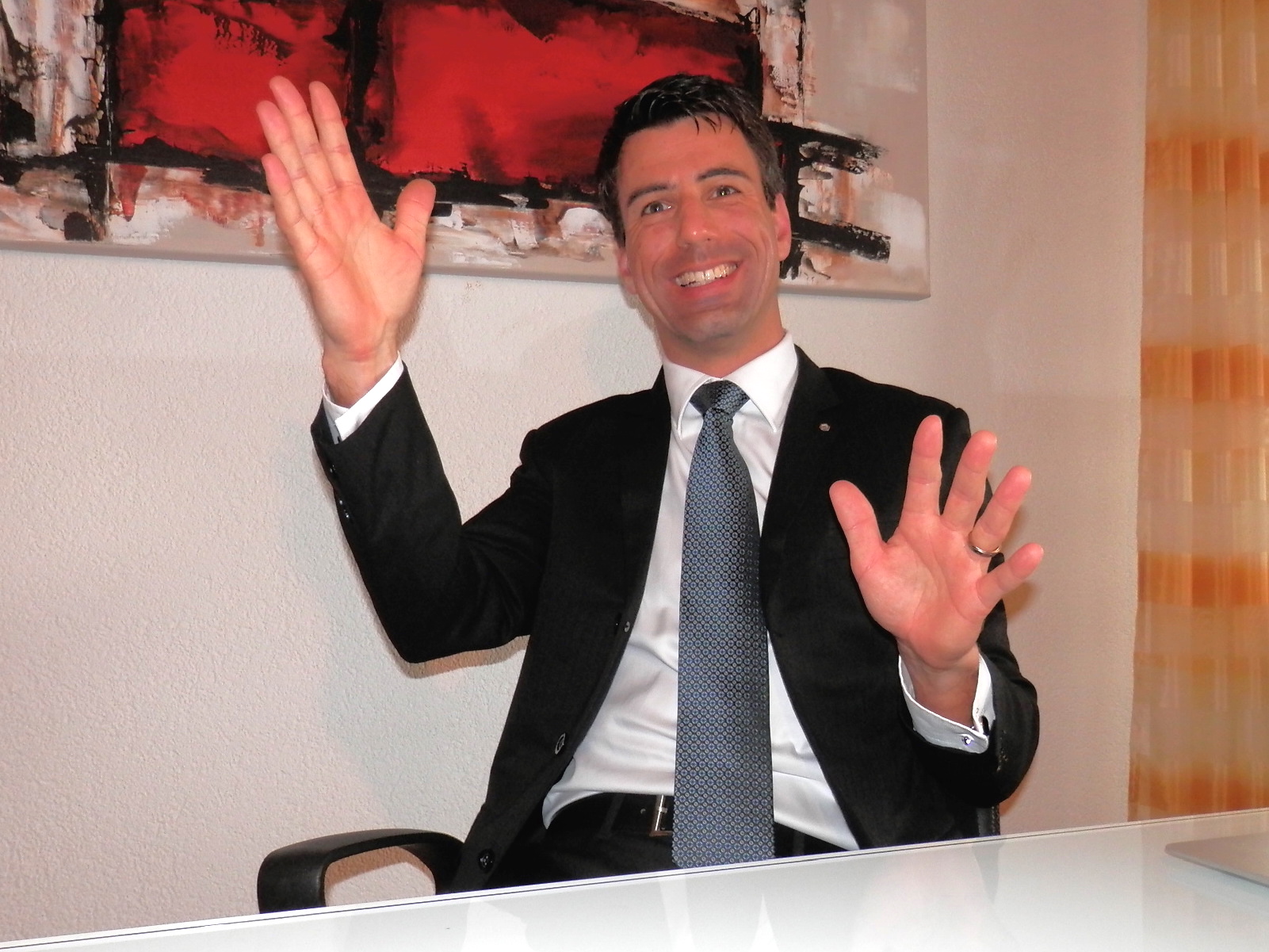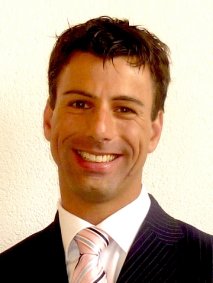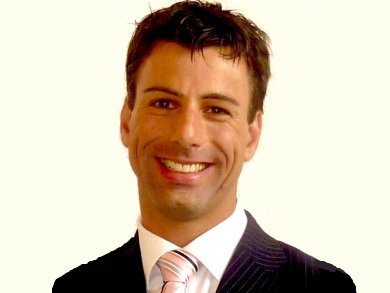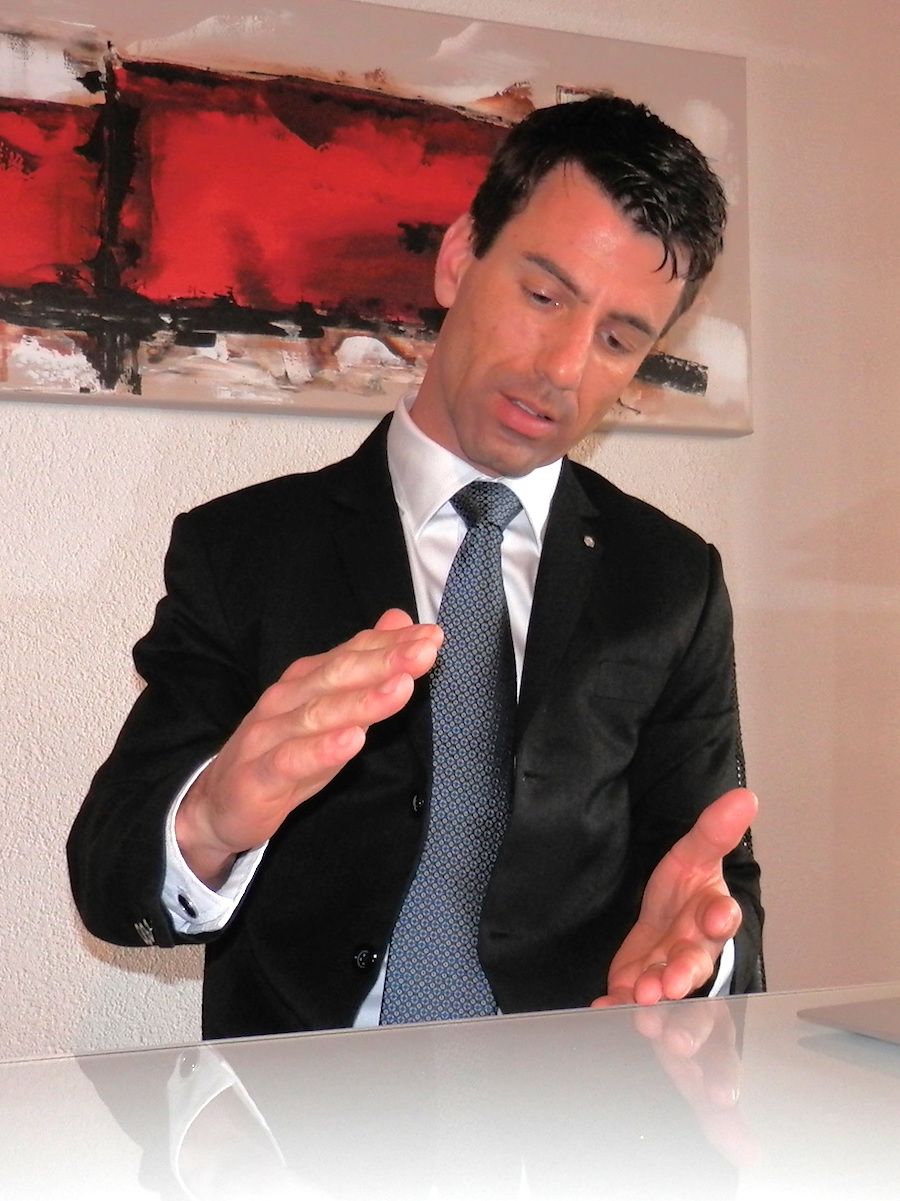David Spichiger is the Executive Director of the Swiss Chemical Society (SCS). He speaks to Drs. Eva Wille and Michael Rowan for ChemViews Magazine about the four strategic pillars of the society, their secret to attract new members, and the Society’s challenges for the future.
David, you joined SCS coming from a global company with more than 50’000 employees. Now you are part of a very small team. What motivated you to join the SCS?
Well, the team is not as small as it seems. It is true that SCS only has about 2.4 full time equivalents. But on a voluntary basis more than 80 people are actively involved in our business and hold an SCS mandate.
For me the most challenging thing is to deal with the liberal work environment and the do-it-yourself approach. While in a big company, especially in the banking business where I come from, everything is well defined and processes are defined in a very detailed way; in the office of the SCS only bylaws, running contracts and some basic rules are available. If you don’t know what to do and how to do it, you are on your own. There is no helpline or no business support that tells you where to go and what to do. So, whenever you intend to do something you always have to check first if your plans conform to the law. But it’s exactly this environment that allows me to push projects and to realize my ideas within a timeline that would never work in a big company.
Concretely, what were the first initiatives that you started after you joined the society?
In our society there are the Divisions that organize most of the member activities. So all events in the first months after my start were set up already and I could focus on the strategy and the back office domain. The most urgent things in the office were to renew the web site and to replace and harmonize the administration tools. This allows us now to provide back office support to the divisions and helps them to focus on the scientific part of their activities. Advertising, all kinds of communication, sponsoring and financial controlling are now standardized supports that are provided by the head office for dividional events.
This increase in efficiency liberated resources and allowed us to open the range of activities to new fields. In early 2012 we reviewed and redefined the strategy of the society and since then we have transformed our ideas into business and implemented about a dozen of measures to make the SCS an attractive society with interesting offers to all its members.
What is the goal of the SCS?
The SCS represents chemists and scientists from chemistry related fields in national and international organizations. The society supports the exchange of scientific and technical know-how and offers corresponding networking possibilities to the academic and industrial community. It has members in more than 50 countries and represents about 2700 individual and institutional members.
The SCS is a member of European Chemical Sciences, EuCheMS, the Swiss Academy of Sciences (SCNAT), and the Swiss Academy of Engineering Sciences (SATW). It is also connected to the International Union of Pure and Applied Chemistry (IUPAC) with the Platform Chemistry of the SCNAT being the Swiss representative.
And what are the offerings that transform the goal into activities?
Key activities of the SCS include …
- Scientific meetings, congresses and courses to assist, inform and educate the community in all fields of pure and applied chemistry.
- Awards for outstanding contributions in a wide range of chemical fields.
- Representation of interests of Swiss scientists in national and international organizations.
- Publication of the scientific journal CHIMIA and the involvement in associated journals, e.g., Helvetica Chimica Acta, Journal of Analytical and Bioanalytical Chemistry, Physical Chemistry Chemical Physics and the journals of ChemPubSoc Europe.
What is your secret to attract new members?
The main goal of a society should be to bind its existing members to the organization. This can be only done in a sustainable way if we provide value to the community and if we keep our good reputation. Even if someone does n
To attract new members we try to provide direct value to young scientists and provide attractive offers. The Fall Meeting of the SCS for example, with some 800 participants and close to 600 scientific presentations, is the largest annual scientific event in Switzerland. PhD students and postdocs give short oral presentations or present a poster in one of the eight sessions. As a SCS member you can submit your contribution for free and the participation is free of charge. This model brings a return of about 200 new, young members per year. To cover the symposium costs and to give very attractive prizes to the best posters and oral presenters we are, of course, reliant on sponsors. Without the support of the industry we would not be able to run this model.
Recently the call for the Swiss Snow Symposium was on your website. Can you tell us more about this event?
The Swiss Young Chemists Association (SYCA) organizes this three-day, annual event in Saas Fee. It combines scientific discussions, networking and fun on the ski slopes and, therefore, fits the young scientists needs. Of course, also this offer is an interesting argument to join the society for young people.
Another example of how the society attracts young members is that together with its partner organizations – the ‘Platform Chemistry of the Swiss Academy of Sciences’ and the ‘Swiss Society for Food and Environmental Chemistry’ – the SCS grants some 45 travel awards to Ph.D. students to enable them to participate actively at an international congress.
You mentioned that it is important to bind senior scientists to the society. What are your efforts in this area?
There are two aspects to keep in mind. The first is to provide excellent scientific content and the second-one is to offer platforms for networking.
In the first field we organize high quality symposia of one to four days, for example, the SCS Spring Meeting, the Swiss Course of Medicinal Chemistry, the Freiburger Symposium, the CHanalysis or the PolyColl meeting. Two years ago we also implemented the SCS Lectureships that brings six to ten top scientists per year to Switzerland. The lecturers, mostly from North America or the Far East, present their recent research within a week at five chemical institutes and offer the opportunity to discuss current topics.
Of course, these events also offer excellent chances for networking and SCS tries to bring people together by organizing dinners and aperitifs before or after these events. As a very new initiative SCS organizes events for R&D heads, leaders of the chemical production and university professors to make sure that industry and academia align their research activities.
The scientific journals are one of your four strategic pillars. What exactly are you providing and where are you involved?
Switzerland always hosted top scientists and published scientific articles on a world-class level. The first channel for Swiss chemists to do so was the journal Helvetica Chimica Acta that was founded by the SCS in 1917. In the meantime HCA is part of the Wiley-VCH group but SCS is still involved as partner and will do its best to keep the journal’s high reputation.
The official member journal of SCS is CHIMIA, a scientific journal for chemistry in the broadest sense. It covers the interests of a wide and diverse readership and represents therefore the interests of all SCS members. The thematic issues, each devoted to an area of great current significance, are one of the characteristic features of CHIMIA.
Since January 2013 SCS is also a full member of the ChemPubSoc community and owns 5 % of the shares of Chemistry – A European Journal. Besides that, SCS participates as co-owner in Physical Chemistry Chemical Physics, and the journal Analytical and Bioanalytical Chemistry.
What are the challenges for the future?
We will try to further improve our offers and to push new initiatives without an increase of budget. The financial challenges will keep us busy and a good relationship to our stakeholder is the key for a successful future.
In the past twelve months we reorganized the internal, financial processes and the allocation of the return on assets. I’m very happy that with the SCS Foundation and the SCS Education Fund we have now two funding sources to realize projects and to implement necessary measures. So, for the moment SCS does not have to reject good ideas because we are short of money. But to be honest, nowadays conditions may change quite rapidly and to ensure middle to long term financing will stay difficult.
One of the big challenges in the future will also be the availability and the commitment of board members. To work voluntarily for the SCS and to manage these additional tasks beside the daily work will make it difficult to find the necessary candidates to take over a mandate within the SCS.
Thank you for the interview.
 David Spichiger studied chemistry at the University of Bern, Switzerland, and joined Credit Suisse in 2001 to work in several functions of the noncore business of the bank. In 2008, he received a Master of Business Administration (EMBA) in integrated management from the Berner Fachhochschule and the Haute école spécialisée de Suisse occidentale in Delémont. He joined the Swiss Chemical Society (SCS) in Bern as Executive Director in 2011.
David Spichiger studied chemistry at the University of Bern, Switzerland, and joined Credit Suisse in 2001 to work in several functions of the noncore business of the bank. In 2008, he received a Master of Business Administration (EMBA) in integrated management from the Berner Fachhochschule and the Haute école spécialisée de Suisse occidentale in Delémont. He joined the Swiss Chemical Society (SCS) in Bern as Executive Director in 2011.
David Spichiger is still active as militia lieutenant colonel in the Swiss Army and leads one of the most renowned athletic clubs in Switzerland as president and coach.



